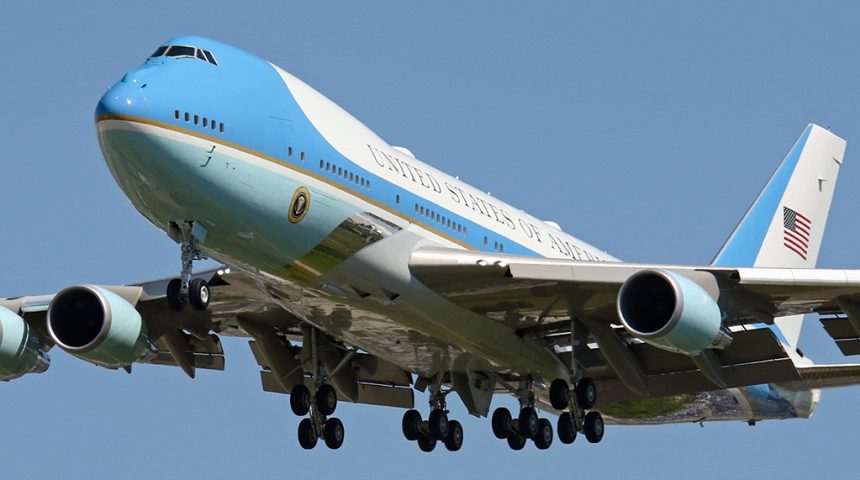Detroit’s Metro Airport Yields Great Photos of Air Force One aircraft and Motorcade.
Local spotters, aviation photographers and aircraft enthusiasts were treated to spectacular views of a U.S. Air Force VC-25A presidential transport aircraft operated by the Presidential Airlift Group of the 89th Airlift Wing of the Air Mobility Command at Joint Base Andrews in Camp Springs, Maryland earlier this week in Michigan. The aircraft, one of only two Boeing VC-25As, was flying with the callsign Air Force One for a presidential visit earlier this week at Detroit’s Wayne County (Metro) Airport.
U.S. President Joe Biden made the visit to Dearborn, Michigan, a suburb of Detroit, for a media event at Ford Motor Company to make remarks about future energy policy on Tuesday, May 18, 2021. Thanks to an excellent spotting community in the area, TheAviationist was able to capture some spectacular photos of both the President’s Boeing VC-25A and the Presidential motorcade.
Luckily for photographers, the best vantage points also provided excellent lighting. In an unusual occurrence, the location where the photos of Air Force One landing were taken was also on the route of the Presidential motorcade as they left the airport area for the trip to the media event. As a result, and thanks to DTW spotters who helped this reporter, we were able to get some excellent photos of both the President’s aircraft and the motorcade.
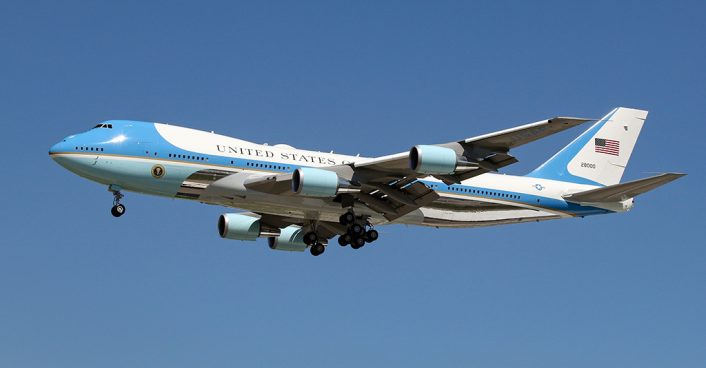
A few select photographers gathered at a location near Metro Airport just prior to the scheduled arrival of Air Force One in Detroit. Secret Service personnel, along with Wayne County Sheriffs and Michigan State Police, checked in on us prior to the arrival of Air Force One and issued specific instructions about access and what could be photographed. They also advised us of restricted areas that needed to vacated when the motorcade approached. For security reasons, some specifics of the photo op cannot be published.
The President’s schedule was published at midnight and enabled us to be well prepared for Air Force One’s arrival in Detroit. Using flight tracking applications and aviation scanners, we monitored the approach of Air Force One to Metro Airport. Exactly on schedule, far in the distance and precisely where it was indicated on flight tracking providers, Air Force One gracefully began its descent toward our home airport. Visibility was good enough that we were able to visually acquire the VC-25A as it entered its downwind leg miles from the airport.
In the distant haze, the massive aircraft banked gracefully onto its base leg where, for the first time, even miles away, it was obvious this was no ordinary aircraft. Air traffic at Metro Airport came to a halt as the giant VC-25A turned left onto final approach and cameras started going off. It immediately became apparent that our location was excellent.
Air Force One landing in Detroit passed directly in front of our photography location at perfect distance to capture both close-ups and photos of the entire aircraft by switching between focal lengths. The first thing that strikes you about this plane is how remarkably clean and well maintained this 40+ year old aircraft is.
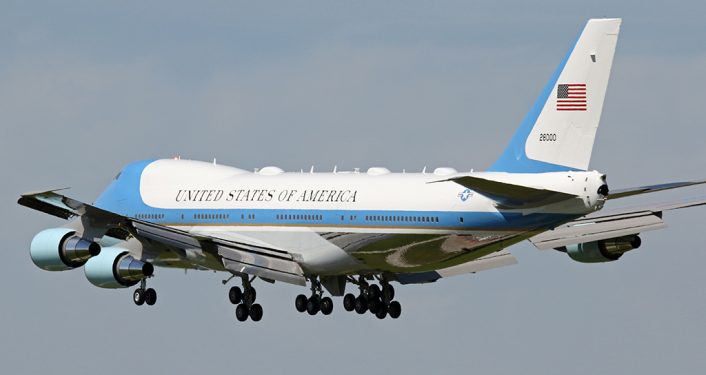
In February of this year, National Geographic released a documentary about Air Force One, its security team and the development of the new presidential transport aircraft. The documentary, “The New Air Force One: Flying Fortress”, gave unprecedented access to presidential transport operations.
After Air Force One performed a picture-perfect final approach to Detroit airport directly in front of us, we quickly relocated to another location nearby in compliance with Secret Service directives to photograph the motorcade leaving the airport with the President on board.
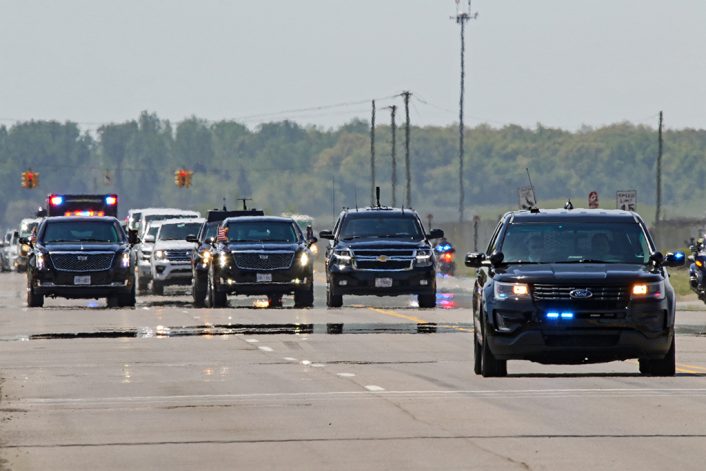
As the President’s $1.5-million-dollar limousine, nicknamed, “The Beast”, approached our group of photographers, the President briefly spotted us and rendered a friendly wave.
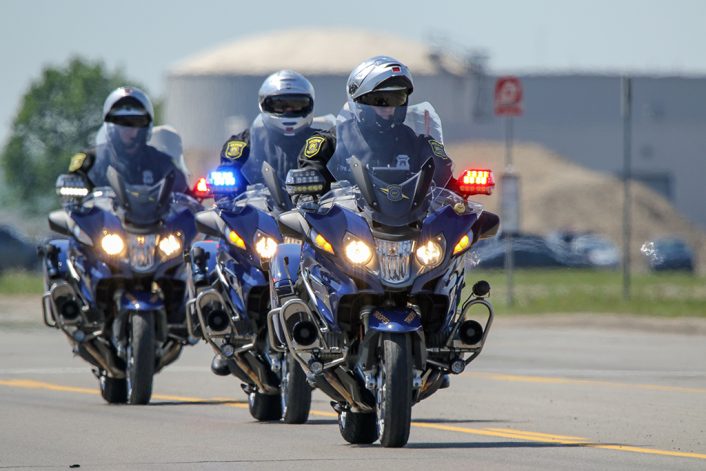
There were two of the specially-built 20,000-pound vehicles in this motorcade, one carrying the President and the other acting as a decoy and backup vehicle. Built on a General Motors truck chassis, the limousine is fully armored against blast and projectiles and resistant to biological and chemical attack. In some locations, the vehicles wear armor plating 8-inches thick. Windows on the car are 5-inch thick blast and projectile-proof clear polymer. Obviously, the vehicle has run-flat puncture resistant tires but, somewhat less obviously, the car also has an onboard gas and smoke ejection system along with a water cannon for emergency crowd dispersal as well as, according to reports, “other armaments”. The car also has a full, pressurized climatic system and secure satellite communications suite on board. And in a final piece of remarkable security tech right out of a James Bond film, the door handles of the vehicle can be energized with a powerful electric current to prevent an unauthorized person from trying to open them.
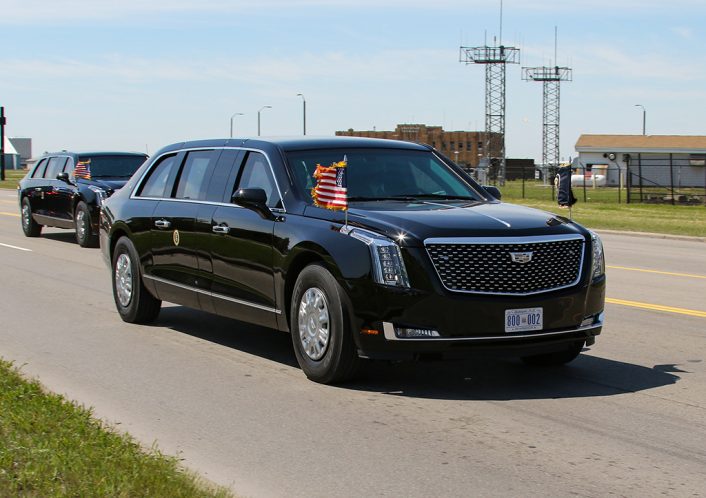
During our observation of the presidential caravan, the two limousines could be seen changing positions in the vehicle order as a security countermeasure.
We also got a rare, close-up look at the other highly secretive vehicles in the President’s caravan. One of the most interesting is a six-door, highly modified, up-armored Ford F350 Super-Duty truck with a host of mysterious communications and defensive equipment on board. This vehicle is a relatively recent addition to the presidential motorcade, and its role appears to be more logistic than some secretly sinister defensive mission.
Journalist and subject matter expert Tyler Rogoway of The Drive and The War Zone has researched and written extensively about the vehicles in the President’s motorcade. He wrote in a June 2018 article that the mysterious, black, dome-topped Ford F350 six-door vehicle is likely tasked with, “providing encrypted voice, internet and video communications via the Pentagon’s constellation of hardened communications satellites”.
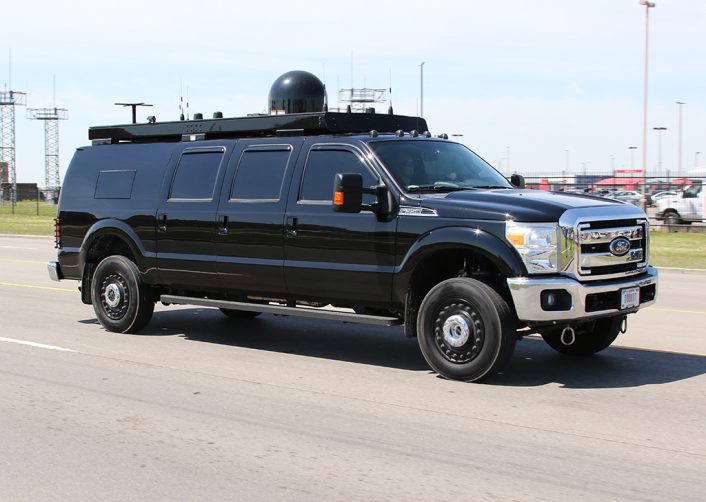
Local law enforcement agencies were also out in force to support the presidential visit, including a large contingent of motorcycle officers and a Michigan State Police Bell Textron Canada 407GXP helicopter.
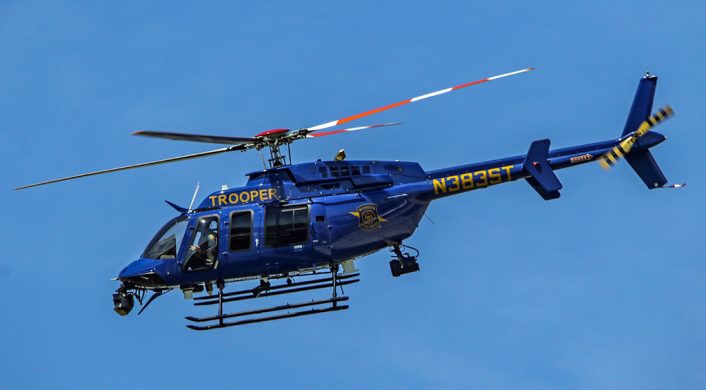
Thanks to our friends Brandon Logan, Robert Helms and Blake Kasparian for their kind assistance with this feature.

